Sunday, November 27, 2005
Hello, I'm Your Sister. Our Father Is Donor 150
The heart of man is deceitful and desperately wicked Jeremiah tells us. Since the fall men have sought to sin in ways that would be culturally acceptable— ways that allow a deceitful heart to rationalize the sin into acceptable behavior.
In Jesus day, apparently it was culturally acceptable to declare one’s goods Corban and thereby honorably relieve one’s self of any obligations to provide for one’s extended family.
In previous centuries, while it would have been considered murder for a man-hater to simply put a bullet in the head of the man he hated as he walked out his front door, it was acceptable to challenge him to a duel and put a bullet in his head from 15 paces. In fact, refusal to participate in such activity was considered dishonorable or cowardly.
We’re no different today. While it’s no longer culturally acceptable to leave your unwanted baby to die in the center of town, it is acceptable to bash in their skull and suck out their brains, provided the baby’s feet are still in the birth canal. If they weren’t, of course, then it would be murder.
While it is illegal to confiscate other people’s labor today without compensation, simply because they are black, it is perfectly legal and acceptable to confiscate other peoples labor without compensation under the elastic currency laws. [For the full explanation of how this works, see the book, Dollar Non¢ents.] Similarly, while no one would condone greedy men collecting money at gunpoint, many consider it perfectly acceptable for greedy men to enact a tax of 90% of other people’s income and then to collect the tax at gunpoint. In fact, participation in such activity by legislators, voters, and special agents is considered worthy public service.
The same games that are played with the 5th, 6th, and 8th commandment are also played with the 7th commandment. In the 7th commandment, God forbids procreation outside of the marriage covenant. Donor eggs and sperm from outside a marriage produce children outside of a marriage. When all the rationalizing is over, participation in such activity by married people is adultery. Participation in such activity by unmarried people is fornication.
Why all these silly distinctions? People know in their heart of hearts that murder, adultery, and theft are wrong. Their conscience accuses them until they are able to sear it. And so they play games in a futile effort to pretend that the murder they are committing is not murder, that the theft they are committing is not theft, or that the adultery they are committing is not adultery.
It is the church, Jesus said, that is to be the conscience of culture. For you are the salt of the earth. The church primarily accomplishes this through Christians living their lives in obedience to the word of God. It is through synods and preaching that Christians are guided and equipped to live their lives in obedience to the Word of God.
All would acknowledge that it is the law of God that must direct and form our conscience. God's Word is the only rule of faith and practice. So when we come to society as salt and light, what other law can we bring than the law of God? What other standard can we use in being the cultural conscience?
Obviously the only standard that we can bring is the law of God. We should not argue for laws against murder and theft because these actions inconvenience us or ruin families. Our reason these things are wrong must be the simple, "Thus says the Lord." By the same token, neither should we discuss the punishment for these sins in terms of what benefits society. Our reason for executing murderers must be because God has commanded the civil magistrate to bring his [i.e God's] wrath on those that do evil. Although societal benefit is not the basis for punishing criminals, we certainly expect that cultural obedience to God's law in this area will bring his blessing on society. This does not exclude the need for laws that are not specifically given in scripture. But our starting point in such discussions must always be the application of God's revealed law to the specific situation in which we find ourselves.
It is when the church, being ashamed of the law of God, begins to argue for right and wrong in utilitarian terms that she becomes unable to speak clearly on ethical issues. She becomes salt that has lost its savor; she becomes a candle hid under a basket.
Thursday, November 24, 2005
A Commissioning
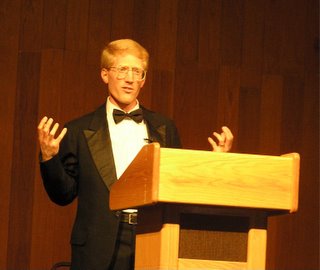
Uncle Ben, with the help of his son, Christian, provided majestic music,
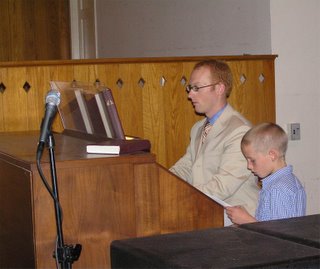
and I gave the commission to Benjamin. A transcript of the remarks is below.
Opening Remarks:
I thank you all this afternoon for the honor of your presence as we celebrate this milestone in the life of our family – especially those friends who aren’t in the greater Allison family - we count you as our family in the Lord and are especially honored to have you with us today.
Olive Branch Academy was established by covenant vows on June 28, 1986 for the glory of God and the advancement of the Christian faith through the propagation and training of Godly children in the fear of the Lord. That means our teachers are not simply under contract to teach, they are bound in a covenant relationship. They don’t take summers off, they don’t have Thanksgiving and Christmas vacations, and they certainly don’t have the weekends off. In fact, this is a 24 by 7 training operation.
Entrance to this school is also different. Entrance is by conception only. There are no interviews or no entrance exams. But once you’re in, death is the only way to leave.
Yes, Olive Branch Academy is a different sort of school.And this is a different sort of commencement. Unlike those graduations RC [Sproul Jr.] was referring to yesterday, this event is not based on the Prussian model of education. Rather it takes it’s precedent from the feast recorded in Genesis 21 in which Abraham celebrated a milestone in the life his covenant son Isaac. The goal of our training is not the attainment of a degree, per se, it is the equipping of God’s children to fulfill the cultural mandate.
Recently, I was talking with a contractor who lives near us in the in town where Texas A&M is located. He had contracted with a lady to redo her kitchen. According to their contract he was to be paid 1/3 on commencement of the work. When he requested the initial payment per the contract, he was surprised to find himself in a bit of a debate. It seems the lady didn't think she needed to pay him anything. Turns out, after a lot of discussion, she thought commencement meant "the end." Being a literate lady, an appeal to the Webster's dictionary settled the debate and she gave him the check he was requesting. On looking at the check, my friend noticed she was a professor of English at the Agriculture and Mechanical College [1]. Well, I suppose everyone has their bad days.
And so today is a commissioning. A commission is a charge, a set of marching orders, that are ongoing. They are orders that are not fulfilled by a single act of obedience; they are orders that can span decades or even a lifetime. They represent a call upon a person’s life. Our commission is to be fruitful, multiply, and rule over the earth to the glory of God.This is an ongoing work that won’t be finished until the day we die. But today we celebrate progress toward the mark of the high calling of God in Christ Jesus. Today we are celebrating the grace of God in this ongoing work in our family. As Abraham celebrated the progress of his covenant son Isaac in no longer needing to be fed from his Mother’s body, today we celebrate the progress of one who has largely prepared to leave his Father and Mother and establish his own home. Today marks the formal presentation of that commission. We do thank you for your presence.
Delivery of the Commission
Benjamin Murray Allison, please rise.
I said in the opening remarks that today is the formal presentation of a commission. That makes it a special day. But there a couple of other reasons that make this occasion special. It is a singular blessing for us to be able to celebrate together God’s grace and faithfulness over many decades in the very midst of a family conference dedicated to the renewal of the family. You mark the start of 2 generations that have been entirely homeschooled. You are part of a heritage that began 45 years ago this very month of September, when a man took a wife and established a home for the glory of God and the advancement of the Christian faith. Yes, one could trace God’s work of grace back much farther. That’s a worthy story we’ll save for some other day. What I want to tell you about now is the faith of that man, your Grandfather. He wasn’t perfect. He had his blind spots, ironically in some of the very areas the homeschool community is often so strong today.
One thing he did have that under girded every aspect of his life and home was incredible self- discipline to not only conform the patterns and fabric of his life to have Jehovah for his God regardless of the syncretism of his day, but to also command his household after him when most of the church was going a different direction. Routinely rising before daybreak, he would go to his study wearing a hat and a couple of sweaters, for he lived much of his life in the bitter cold of the Dakotas, and keeping a house at 68 all night was much to expensive a proposition for either his Scotish sensibilities or his pocketbook. There he would read the scriptures in several languages and pray.
He also knew a full and hearty breakfast was critical to a day of hard labor, something that should be fundamental to a Christian’s life, so he made breakfast – a task soon passed on to the next generation. But while most of the Christian church was following after the convenience of boxed cereal and store bought milk, he was going the other way and building the means of food production in own home. To his way of thinking boxed cereal just couldn’t be good, though he probably couldn’t have told you exactly why — that would have to wait for the nutritional research of his helpmeet — and buying milk from the store would never teach anyone the value of labor or how to exercise godly dominion in harvesting the earth’s resources for food. And so without fail each morning, he would wake his family and after prayer and singing of a psalm, he would send them out to milk the goats, gather the eggs, and cook the breakfast. A breakfast that consisted of such things as millet, or oat groats, or corn meal mush sweetened with honey harvested from his bees or parsimons gathered off of the ground or from the trees of perfect strangers who were too busy pursuing their peace and affluence to harvest their own fuit trees. They weren’t gourmet meals, but everyone in the family older than 4 knew how to cook them.
In the 60’s and early 70’s while most men his age in the Christian church were growing long hair to be in style and allowing their children to grow even longer hair, this man, with his keen perception, recognized it for what it was, a form of syncretism, and regularly cut his son’s hair to look like men. On Saturdays and evenings while many in the Christian church in America were watching family television his family was working – butchering, birthing goats, doing the laundry, digging a new compost hole for the kitchen garbage, adding a new outlet here or a water line over there, building a passive solar system for the backyard bedroom, baking bread, (in a day before the world had heard of bread machines and kneading it meant wrestling 10lbs of dough on the kitchen table) or doing various and sundry other projects that had all the neighbors scratching their heads. Other than two brief periods there wasn’t a TV in the house. Today not having a TV is common among Christians, then, I didn’t know another family without a TV – although I am sure the Lord had his 7000 people who had not bowed the kneel to Baal even as he did in the days of Elijah.
In a day when many Christians were buying the largest house they could afford with masterbaths and beautiful entertainment centers, he was buying the house with the biggest lot and the most fruit trees.
In a day when many in the Christian church were banishing their children out of the
church to children’s story time, his was the family whose children stayed in the
worship service and sang the hymns and listened to the sermon.
In the pre-homeschool days of his family, while most Christian parents were driving
their children to school “because these days were different and the streets weren’t safe”, his children were riding their bikes to school on their own over “dangerous” and busy roads. Only he could tell you how many Christian brothers counseled him that he was foolishly endangering his children. He understood he was teaching his children to both put their faith in the God who delivered his Isrealite children from the most powerful army in the world, who brought water from a rock, and who fed them with manna in a dry and desert land, and to take the risks that accompany kingdom work.
I could go on, but maybe you are getting the picture. Your grandfather worshipped God every minute of every day and if that meant being different from what most Christians families were doing with their lives, so be it. It’s not the goats or the bread making that matter. Those things simply happened to be the outward form of his worship. The important point is he did not pollute the pursuit of the Glory of God with the pursuit of prosperity and affluence. And as a result, God has blessed him with 4 sons, all of whom are ordained to the office of elder and 6 families who are
following in his footsteps, working out their salvation with fear and trembling.
You are the third generation — the oldest of 29 others. You have been given much. To whom much is given, much is required. You have publicly professed faith in Jesus Christ and that is good. Your mission is continue in that profession. Your mission is to identify the syncretism of your day for it will take a different expression than the syncretism of your grandfather’s day.
I ask you this afternoon, not who will you serve, for you have professed before the congregation of the saints your desire to follow Christ, but how will you serve the God that has created you? Will you will be content to mix the worship of Almighty God with the pursuit of your pleasure and affluence? Or will you follow the footsteps of your father in the Lord, your earthly grandfather, and without being proud to be separate or embarrassed to be different, wholeheartedly worship Jehovah, the One who shows mercy to a thousand generations of those that love him and keep his commandments.
I charge you this day to be a king, ruling over your own passions bringing them into
subjection to the written word of God and daily overcoming the sin that dwells in you so that one day you may be able to command your family after you.I charge you this day to be a priest, pleading daily before the throne of grace for the work of the Holy Spirit that you would be enabled to do all that God has commanded.
I charge you this day to be a prophet of the of the most high, daily bringing to yourself the Word of God that you may be complete thoroughly furnished unto every good work.
The Matriach leading some final singing preparation.

A member of the class of 2023 receiving an early lesson in listening.

Discussing some final choreography.
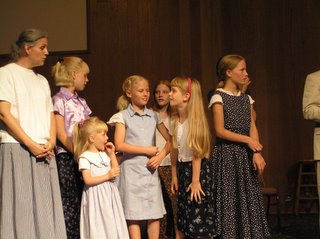
Reciting the book of James.
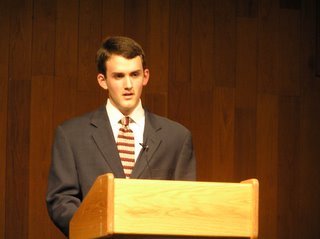
A Call to Young Men
Tuesday, November 22, 2005
Taxing An Unfriendly Church
Shortly before the last election, a former rector at All Saints Episcopal Church in Pasadena, Calif., gave a fiery antipoverty and antiwar sermon. He did not endorse a presidential candidate, but he criticized President Bush's policies in Iraq and at home. Now the Internal Revenue Service has challenged the church's tax-exempt status.Important Correction: Freedom of religion does not grant freedom from taxes if state sponsored churches engage in politics. The tax code says nothing about churches that are not state chartered entities.
I.R.S. officials have said about 20 churches are being investigated for activities across the political spectrum that could jeopardize their tax status. … The I.R.S. argues that freedom of religion does not grant freedom from taxes if churches engage in politics.
26 USC Sec 501 (c) 3 is quoted in its entirety below:
CITE-
26 USC Sec. 501 (01/19/04)
-EXPCITE-
TITLE 26 - INTERNAL REVENUE CODE
Subtitle A - Income Taxes
CHAPTER 1 - NORMAL TAXES AND SURTAXES
Subchapter F - Exempt Organizations
PART I - GENERAL RULE
-HEAD-
Sec. 501. Exemption from tax on corporations, certain trusts, etc.
-STATUTE-
(3) Corporations, and any community chest, fund, or foundation, organized and operated exclusively for religious, charitable, scientific, testing for public safety, literary, or educational purposes, or to foster national or international amateur sports competition (but only if no part of its activities involve the provision of athletic facilities or equipment), or for the prevention of cruelty to children or animals, no part of the net earnings of which inures to the benefit of any private shareholder or individual, no substantial part of the activities of which is carrying on propaganda, or otherwise attempting, to influence legislation (except as otherwise provided in subsection (h)), and which does not participate in, or intervene in (including the publishing or distributing of statements), any political campaign on behalf of (or in opposition to) any candidate for public office.
This section of the code claims to apply only to corporations, community chests, funds, and foundations. It says nothing about churches. The only way a church could be included in this prohibition is if it is incorporated by the civil magistrate.
Churches that are incorporated as 501(c)3 organizations are legal entities created by the state and put in the same category as your local society for the prevention of cruelty to animals or diabetes foundation. Legally and effectively they are state churches and the content of their preaching is controlled by the state.
Many reformed pastors today would argue that the church shouldn’t be trying to influence legislation. It should be preaching Christ and Him crucified. Therefore this restriction poses no problem to the church.
There are two problems with this approach:
- It ignores the legal fact that incorporated 501(c)3 churches are legal entities created by the state and institutionally inferior and subject to the state. If the church of Jesus Christ is not an institution created by the state, then how is it acceptable for it to exist as one?
- Is it really biblical that the church should not try to influence legislation?
God has ordained marriage between one man and one woman to be a picture of the union between Christ and his Church. Should we teach that? Should we teach husbands that their love for their wife is to be like the sacrificial love Christ has toward us? Should the church teach God’s people that a law allowing sodomite marriage is a perversion of something that is holy and typical of our union with Christ? Scripture says sin is a reproach to any people. Should the church teach that allowing sodomite marriage is a reproach on our nation?
Scripture teaches that we are to render to Caesar the things that are Caesar’s and that we are to honor him. Should we teach God's people that they have a duty to pray for their civil magistrate, to vote in his elections, and render obedience to him? Scripture says that everything we do, even our eating and drinking, is to be done to the glory of God. Should the church teach the people that even in their voting they are to glorify God and that a vote to permit what God has forbidden does not honor the Lord?
Proverbs 20:26 says, "A wise king scatters the wicked, and brings the wheel over them." Should the church teach this wisdom to God’s people and help them apply it in their life? Should the church be seeking to disciple the civil magistrate? Is he included in "all the nations?"
If we as the church are doing all this, aren’t we influencing legislation?
Mat 5:13-18 Ye are the salt of the earth: but if the salt have lost his savor, wherewith, shall it be salted? it is thenceforth good for nothing, but to be cast out, and to be trodden under foot of men. Ye are the light of the world. A city that is set on a hill cannot, be hid. Neither do men light a candle, and put it under a bushel, but on a candlestick; and it giveth light unto all that are in the house. Let your light so shine before men, that they may see your good works, and glorify your Father which is in heaven. Think not that I am come to destroy the law, or the prophets: I am not come to destroy, but to fulfill. For verily I say unto you, till heaven and earth pass, one jot or one tittle shall in no wise pass from the law, till all be fulfilled.
It is in the context of reminding us that we are the salt of the earth and that we are to let our light shine before men that Jesus affirms that he did not come to destroy the law.
If we are being the salt of the earth and the light of the world and we are discipling all nations, doesn’t that imply we will be influencing legislation?
I think one can rightly conclude that when the church ceases to influence the legislation of the nation, she becomes salt that has lost its savor; she has become a candle hid under a basket.
Monday, November 21, 2005
2nd Peter Goes to Europe

As those with little ones know, the thinking going on in their precious little heads can be downright hilarious at times. Today while cleaning a closet Alice pulled a suitcase out of the closet and put it behind her. 2nd Peter immediately pulled it to his dresser and started packing. When Alice turned around, it was nowhere to be seen. With her Mother's instinct she immediately guessed what might have happened to it. On finding that he had already transferred half his earthly possessions into it, she asked him where he was going. To which he replied, Europe. This proved too good an opportunity for his older brother to pass up. He began the 20 questions routine.
How are you going to get there?
Fly.
Where are you going to sleep?
Europe.
Where will you get money?
Oh yes, I need money.
Peter reviewing his travel expense accounts.

Sunday, November 20, 2005
The Civil Magistrate and the First Table
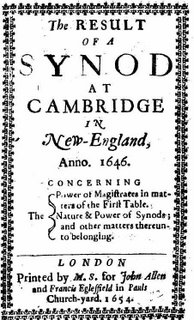
On July 1, 1646 a Synod met at Cambridge, Massachusetts to discuss the following question:
Whether the Civil Magistrate in matters of religion or the first table, hath power civilly to command or forbid things respecting the outward man, which are clearly commanded and forbidden in the word, and to inflict suitable punishments according to the nature of the transgression against the same, and all this with reference to godly peace?Their answer was:
The want of a right stating of this question touching the civil magistrate's power in matters of religion hath occasioned a world of errors, tending to infringe the just power of the magistrate, we shall therefore explain the terms of the questions and then confirm it in the affirmative.
The synod first looked at all the Old Testament evidence for such a requirement. And then (surprise, surprise) they looked at the New Testament evidence supporting their position. Stay tuned for some of their arguements in coming days.
Saturday, November 19, 2005
The US is Tough on Crime?
And first, of such as deserve capital punishment or cutting off from a mans people, whether by death or banishment
1. First, Blasphemy which is a cursing of God by Atheisine or the like to be punished with death.
2. Idolatry to be punished with death.
3. Witchcraft which is fellowship by covenant with a familiar Spirit to be punished with death.
4. Consulters with Witches not to be tolerated, but either to be cut off by death, or by banishment.
5. Heresie which is the maintenance of some wicked errors, over- throwing the foundation of Christian Religion, which obstinacy, if it be joyned with endeavour to seduce others thereunto, to be punished with death because such an Hereticke no, less than an Idolater, seeketh to thrust the soules of men from the Lord their God.
6. To worship God in a molten or graven Image, to be punished with death.
7. Such members of the Church, as do willfully reject to walk after due admonition, and conviction, the Churches establishment and their christian admonition and censures, shall be cut off by banishment.
8. Whosoever shall revile the Religion and Worship of God, and the Government of the Church as it is now established, to be cut off by banishment.
9. Willful perjury, whether before the judgement seat or in private conference, to be punished with death.
10. Rash perjury whether in publicke or in private, to be punished with banishment, just it is that such a man's name should be cut off from his people, who profanes so grossly the name of God before his people.
11. Profaning of the Lords day, in a carelesse and scornful neglect or contempt thereof to be punished with death.
12. To put in practice the betraying of the Country, or any principal sort therein to the hand of any foreign State, Spanish, French, Dutch, or the like: contrary to the alleageance we owe, and professe to our Dread Sovereign Lord King Charles, His Heires and Successors; which he is pleased to protect us as his loyal subjects to be punished with death.
13. Unreverend and dishonorable carriage to Magistrates to be punished with banishment for a time, till they acknowledge their fault, and professe reformation.
14. Reviling of the Magistrates in highest rancke amongst us, to wit of the Governours and Counsell to be punished with death.
15. Rebellion, Sedition, or Insurrection, by taking up armes against the present Government established in. the Country to be punished with death.
16. Rebellious children whither they continue in riot or drunkennesse after due correction from their parents, or whether they curse or smite their Parents, to be put to death.
17. Murder which is a wilfull man-slaughter not in a man's necessary and just defense, nor casually committed, but out of hatred or cruelty to be punished with death.
18. Adultery which is the defiling of the marriage bed, to be punished with death. Defiling of a women espoused, is a kind of Adultery and punishable by death, of both` parties; but if a woman be forced, then by the death of the man only.
19. Incest, which is the defiling of any near of kin, within the degrees prohibited in Leviticus to be punished with death.
20. Unnatural filthinesse to be punished with death, whether sodomy, which it carnal fellowship of man with man, or woman with woman;Or Buggery. which is carnal fellowship of man or woman, with beast or fowles.
21. Pollution of a woman known to be in her flowers to be punished with death.
22. Whoredome of a maiden in her father's house, kept secret till after her marriage with another, to be punished with death.
23 Man-stealing to be punished with death.
24. False witnesse bearing to be punished with death.
What is not shown in the above excerpt are the scripture proofs in the margin of the text of the law. The civil magistrate was understood to be God's ordained servent to execute God's wrath on those that do evil. This authority is from God. Where else but scripture can the civil magistrate learn what God's wrath is, that he is supposed to execute?
Friday, November 18, 2005
Shaking the Foundations of Faith?
An event that occurred 250 years ago today stands as a singular reminder that the war between faith and science in America did not start in Dover, Pa., where several school board members who promoted the teaching of intelligent design were voted out of office last week, …
IF people are dismayed to find fresh examples of the type of faith that blames victims of natural disasters … for causing their own misery, it is comforting to see that the other kind of faith is also alive and well. For that, we need look no further than Franklin's adopted home state, Pennsylvania. No doubt many of those who voted for science on Election Day in Dover went to church the following Sunday.
For Franklin and his like-minded contemporaries, scientific pursuit was the ultimate act of faith; faith that there was an order to be discovered and faith in our ability to discover it.
If scientific pursuit is the ultimate act of faith that there is an order to be discovered, then who is more rational?
1. A Christian scientist who, believing an orderly, all-powerful God created the word and governs it day by day, looks for order and principled coherence in the world; or
2. An atheist scientist who, believing the world has evolved randomly from chaos by improbable events rarely if ever seen today, looks for order and principled coherence in the world.
Good point Mr. Liell. Thank you for setting it up so nicely. And surprisingly, for a random product of chance mutations, Mr. Liell most likely makes another true point, although I am afraid it reflects very badly on the church. No doubt many of those who voted for irrational science on Election Day in Dover did go to church the following Sunday.
Thursday, November 17, 2005
A Quarter of Texas Supports Legalizing Sodomite Marriage
SECTION 1. Article I, Texas Constitution, is amended by adding Section 32 to read as follows:
Sec. 32. (a) Marriage in this state shall consist only of the union of one man and one woman.
(b) This state or a political subdivision of this state may not create or recognize any legal status identical or similar to marriage.
On Tuesday last week, 76% of the voters in the state of Texas exercised their judicial authority to uphold the law of God in the state. 24% of the voters attempted to cast down the law of God, calling good evil, and evil good. In many rural counties the vote ran as high as 10:1 for the amendment. Travis county was the only place the amendment actually lost (by 2:3 margin).
But I don't know which is the greater tradgedy, that over half a million people in Texas think sodomy is acceptable or at least were willing to vote to bring reproach on our land; or the 10,322,980 people who didn't care enough to vote. I grant there were probably some who honestly forgot, some who were in coma's in the hospital and so on. That still leaves 10,000,000 people who didn't care if a reproach was brought on the land or not.
Polls indicate that 30% (or about 4,000,000 registered voters) consider themselves Christian in the state of Texas. If everyone who voted to pass the amemdment was a part of this group, then there were 2.3 million people who consider themselves Christian but did not vote to outlaw what Christ has declared to be outside the law. Clearly the problem in our culture is merely a reflection of a bigger problem with the church.
Until the church of Jesus Christ becomes the salt of the earth, the light set on a hill, we have no room to complain about the course of society, the state of our public schools, or the tyranny of judicial legislation.
But I am grateful for the 1.7 million people who honored their Creator at the polls last Tuesday. Thank you.
Wednesday, November 16, 2005
Cantate et Labora?
Tuesday, November 15, 2005
Roger Williams: Hero or Villian?
Roger Williams wasn’t arguing simply for the right of Christians to differ; they already had that. Neither was he arguing that the church and state should be separate institutions; they already were. He was arguing against the authority and responsibility of the civil magistrate to enforce the law of God in society.
Today we are reaping the mature fruit of Roger William’s ideas when the Supreme Court strikes down sodomy laws, restricts states ability to outlaw abortion, or refuses to allow prayer at official functions. A nation either upholds God’s law or it upholds man’s law. There is no middle ground. It is not possible to separate the State from religion. It will always be religious. It will always enforce some standard of law. The question is: whose law will it uphold, God’s law or man’s law? Let me illustrate this from Roger Williams himself.
Roger Williams wrote a private letter to John Cotton asking for his opinion on a matter respecting freedom of conscience. When Mr. Cotton answered his questions in a private reply, Mr. Williams then published Cotton’s response along with a counter-response attacking him as a man of blood. In the preface to his book, The Bloody Tenant Washed White In The Blood Of The Lamb, Mr. Cotton wonders how this is consistent with his position. If his private letter was full of errors, why punish him by publishing it along with a scathing attack? Doesn’t he [Cotton] have liberty of conscience to believe as he sees fit? Also, why publish something so unedifying? On the other hand if his letter was true, why attack him as a man of blood?
Roger Williams had as little toleration for those who disagreed with him as the Puritans had for his erroneous ideas. Isn’t this the same sort of intolerance masquerading as tolerance that we see today?
Mr. Williams was not a consistent theologian or even an exemplary person.
- He fled England in 1630 because be could not tolerate the Anglican practice of open communion.
- He was offered a pastorate in Boston by the Puritans, which he turned down because he could not tolerate their non-separatist congregationalism.
- He was critical of the Plymouth church for not being separatist enough.
- He returned to England and was critical of the Anglican Church for being too lenient.
- He returned to Salem where he accepted a pastorate. From his pulpit be began attacking the validity of the King’s land patents. He accused the Plymouth and Massachusetts Bay authorities of essentially stealing the land from the Indians.
- He attacked the Anglican church for not being a true church
- He refused to take an oath, along with all the other residents of Massachusetts, to defend the land against enemies because that was an act of worship and would involve him in worship with unregenerate people. He essentially was denying that the civil magistrate was God’s servant, ordained to execute God’s vengeance on those that do evil (defined as breaking the law of God) and possessing the power to administer judicially binding oaths.
- He taught that regenerate and unregenerate people should not pray together – including spouses and children.
- He believed there should, therefore, be no prayer of thanks before meals.
- He nearly split the church with these ideas, committing the sin of schism. The church was saved when he went on to claim that Massachusetts’s churches (of which he was a part) were not true churches, causing people to leave him.
- He fled the state, with a few disciples, to avoid deportation to England by Massachusetts’s authorities. There he was joined by the renegade antinomian, Mrs. Hutchinson.
- From Rhode Island he reversed his position on infant baptism rejecting pædo-baptism.
- He had all his followers re-baptized and then concluded that this baptism was not valid and they would have to wait for another apostolic power.
- He withdrew from the church and decided that he could only take communion with his wife. Then he reversed himself again, deciding that it was not possible for the church to achieve purity in this life and renouncing his extreme separatism.
- He couldn’t agree with anyone, moving from England to Boston, to Salem, to Plymouth, to England, back to Salem, and then to Rhode Island within a space of 6 years.
A better analogy for this man might be Joseph Smith, the founder of Mormonism. They both rejected lawful authority, led gullible disciples into exile, changed their beliefs with the weather, and rejected the historic faith practiced by the church universal. I would note that this is very different from the reformers who corrected serious errors in the church by going back to the historic faith, not inventing new ideas. From the judicial safety of Rhode Island he wrote of Massachusetts,
"My end is to discover and proclaim the dying and horrible guilt of the bloodyYou would think he was writing about someone who had been drawn and quartered in the Spanish Inquisition instead of Governor Winthrop and his fellow pilgrims who had merely excommunicated him for heresy and sought to deport him to England.
doctrine, one of the most seditious, destructive, blasphemous, and bloodiest in
any or all the nations of the world…"
His book, the Bloudy Tenent of Persecution, spells out in detail his rejection of God’s law as the civil law of the land. It was directly answered at the time by John Cotton and by several church councils. ( e.g. the Synod of Cambridge, New England, 1646 concerning the power of magistrates in matters of the first table.) Thankfully, for nearly 150 years, most Christians in America rejected his ideas. States required all officers, from Notary Publics to legislators, to take religious test oaths affirming the deity of Jesus Christ as the second person of the Godhead, and the scriptures of the Old and New Testaments as the Word of God. It wasn’t until the constitution was written that religious test oaths were removed from America.
In American jurisprudence, the 10 commandments were seen as the basis for all civil law. In many cases the statutes directly quoted or cited scripture as part of the law. Although the laws varied a little from state to state, egregious violations of all the commandments (except the 4th and 10th) were capital crimes. Gradually the capital sentence was dropped from some of the commandments and then some of the commandments themselves were dropped from our civil laws. The usual pattern has been to cease prosecuting the violation of the law and then after years of disuse, to remove it. This pattern continues to this day. Most recently states have repealed all laws regarding the 4th commandment. Violations of laws regarding the 7th commandment are rarely prosecuted and in many cases have been repealed. About all we really have left today are laws respecting the 6th and 8th commandments- except that it’s OK to murder people if they are not yet born!
Such is the legacy of rejecting God’s law as the civil law of the land.

 Putting the singing part to good use while helping Daddy.
Putting the singing part to good use while helping Daddy. 





